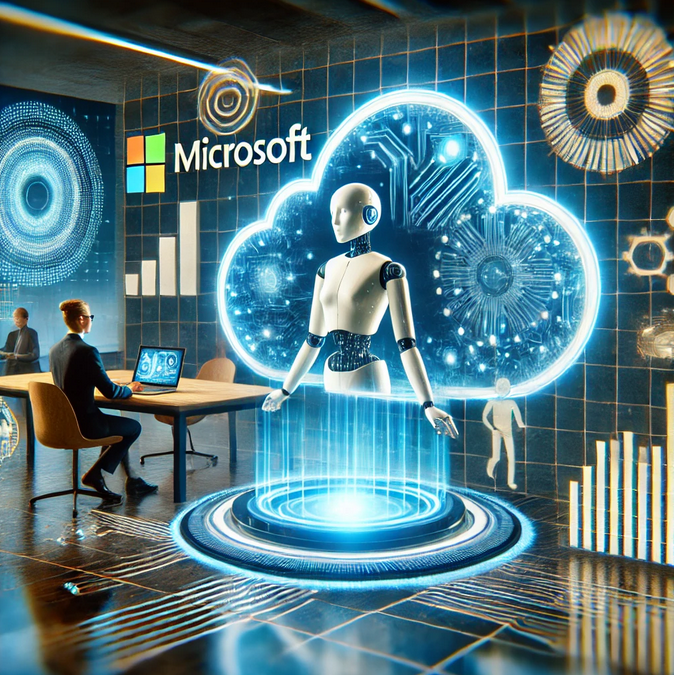BETTER 68 YEARS LATE THAN NEVER
(MSFT), (GOOGL), (AMZN)
Here's a fun bit of trivia: The term "artificial intelligence" was coined in 1956 at a Dartmouth College workshop.
The organizers thought they could teach machines to use language, form abstractions, and solve problems reserved for humans. Their estimated timeline? About two months.
Sixty-eight years later, Microsoft (MSFT) just showed us how hilariously wrong that timeline was - and more importantly, how massively profitable being right about AI's timeline can be.
While everyone's been watching ChatGPT make headlines, Microsoft has quietly turned its OpenAI partnership into a money-printing machine. We're talking about 33% growth in Azure cloud sales, with AI services alone responsible for 12 percentage points of that growth.
Let that sink in for a moment.
In the latest quarter, Microsoft's revenue jumped 16% to $65.6 billion, accelerating from the previous quarter's 15.2% growth. And here's what really gets my attention: Microsoft's net margins are already sitting pretty at 38%, with a clear pathway to 45% as AI scales up.
But wait - it gets better.
Remember when everyone thought the $10 billion OpenAI investment was crazy? Well, management is now projecting $10 billion in annual AI-related sales.
That might seem like pocket change for a company expected to rake in $286 billion, but here's what the market is missing.
Microsoft 365 Copilot alone is projected to generate $4.6 billion in revenue this fiscal year. And that's with only 4% of the Office user base signed up. Do the math on full penetration, and you'll see why I’m getting excited.
Now, let's talk about OpenAI's new "o" series models - the secret weapon nobody's discussing at cocktail parties. Unlike traditional AI that processes queries in one shot, these babies use what the pointy-heads call "chain-of-thought" (CoT) reasoning.
Think of it as AI that can actually think longer and harder about problems, like a chess grandmaster considering multiple moves ahead.
The results on the ARC-AGI-PUB benchmark tests are making Google's (GOOGL) engineers sweat through their hoodies. And thanks to those exclusivity clauses my legal friends keep raving about, Microsoft gets first dibs on every breakthrough.
But here's the kicker that makes this a potential portfolio game-changer: Microsoft is sitting on $116.2 billion in cash with only $45 billion in debt. That's a war chest that makes competitors nervous, especially when you're talking about the billions needed for those precious Nvidia GPUs that power AI data centers.
Sure, the stock isn't cheap at 33 times forward earnings. But with double-digit revenue growth locked in for years and quickly expanding margins, that multiple starts looking reasonable.
Now, I'm not saying it's all sunshine and APIs. Google and Amazon (AMZN) are throwing billions at their own AI programs.
There's also that pesky clause about OpenAI potentially restricting Microsoft's access if they achieve artificial general intelligence (though my tech buddies tell me that's about as likely as San Francisco having affordable housing).
And yes, any broad market tantrum could hit high-multiple tech stocks like a concrete pillow. But here's what keeps me up at night: What if we're still underestimating the impact of truly intelligent AI on enterprise software?
Those Dartmouth professors in 1956 thought they could solve AI in two months. They were off by about seven decades. But Microsoft isn't making the same mistake of underestimating the timeline - they're playing the long game.
Between the OpenAI partnership, that fortress balance sheet, and enterprise customers practically begging to pay for Copilot, this could be one of those rare moments when a mega-cap tech stock is actually undervalued.
Just remember you heard it here first. By the time the Wall Street Journal catches up, the easy money will already be gone.
Speaking of gone - I just found those original Dartmouth workshop notes buried in my office. Apparently, they also predicted flying cars by 1957 and robot butlers by Christmas.
Maybe I should feed those predictions to ChatGPT and see if it laughs. Though at Microsoft's current pace, it might just start building those robot butlers instead.


